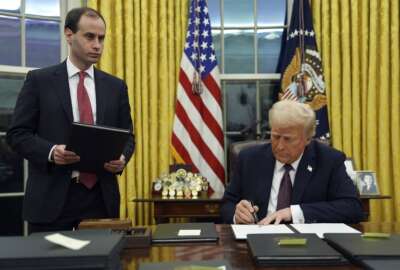DoD reassures Congress it is fixing contingency contracting
Senior defense leaders told Congress they\'ve already made huge steps toward implementing the recommendations of the Commission on Wartime Contracting. Former...
wfedstaff | June 4, 2015 12:59 pm
Defense leaders assured members of Congress Wednesday that they’re taking the recommendations of the Commission on Wartime Contracting seriously, and have already taken major steps to implement them.
The headline from the release of the commission’s final report in August highlighted waste, fraud and abuse of between $31 billion and $60 billion in Iraq and Afghanistan. The panel made 15 recommendations designed to get DoD, the State Department and other agencies on a path toward better management of contracting in overseas contingency operations.
DoD leaders say although the department failed to take management of contingency contracting seriously in the past, they do now. Frank Kendall, the acting undersecretary for acquisitions, logistics and technology, told a Senate subcommittee Wednesday the Pentagon agrees, in principle, with all 11 of the recommendations that are directed toward DoD. He said the culture around contingency contracting already has changed.
“Contracting has to be commanders’ business. It is part of the force,” he said. “When half the people you deploy are contractors, they have to be managed as part of the force. We’re on the third edition of our contingency contracting handbook for contracting officer representatives, the people who supervise day-to-day. There’s one about contracting as a weapon. The department has got it. We have got the fact that when we do an operation like this, and we put contractors out there in equal numbers to the soldiers we put on the ground, we’ve got to manage them just as effectively.”
Kendall testified before the Senate Armed Services Subcommittee on Readiness and Management Support on a panel that also included former members of the commission. Commissioner Dov Zakheim told senators there’s no doubt been progress since contract mismanagement was in the headlines, circa 2007.
“But unfortunately, the commission has concluded that the U.S. military and other federal agencies are still not prepared to plan and manage large-scale contingency operations,” he said. “The issue is less one of policy and more one of implementation. Policies are easy to make. Implementation is what counts. And we’re not alone in our concern. The GAO has had defense contract management on its high-risk list since 1992. So this is going on for 20 years.”
Oversight of poor performers not good
Defense still needs to do a better job of holding contractors accountable, Zakheim said. Tools, such as suspension and debarment of poorly-performing or misbehaving vendors still aren’t being vigorously applied and enforced, he said. Data on past performance of often goes unrecorded in federal databases. And, he said, DoD is still remiss in promoting competition — multibillion task orders are still being written without recompetition or changes to original contracts.
But Lt. Gen. Brooks Bash, director of logistics for the Pentagon’s Joint Staff, said DoD truly is operating differently, and now is giving contingency contracting the attention it deserves. He acknowledged that when the military first entered Iraq, no one even thought about the issue of contract management. But he said things were dramatically different in two recent contingency operations: the responses to the Haiti earthquake and the Japanese tsunami.
“When I arrived in Japan, the J-4, the logistics expert, had done two things in this vein. He immediately started a contracting board to make sure contracting actions were commensurate with what the commander wanted,” he said. “The second thing they did is it was integrated in the joint effects board, to make sure that the contracting actions did not waylay our efforts. Why is that important? It has bubbled all the way down to the operational level in two very important humanitarian relief operations. We have a ways to go, but I’m confident that we’re actually getting there.”
The commission believes many of the problems spring from the fact that there is no single, strong advocate for management of contingency contracting in the Pentagon. It recommended the creation of a new “J-10” position on the Joint Staff to do exactly that. But DoD disagrees with the recommendation.
Katherine Schinasi, another former commission member, said their rationale is that contingency contracting is going to be something the military will have to deal with for years to come in every overseas operation, and considerations about all aspects of contingency contracting need to be thought through at the highest level.
“What we’re talking about is elevating this beyond even the acquisition function,” she said. “Management is very important, but it’s really the initial decision to use contractors that begins the whole need for the management structure. The decision to use contractors is really a policy issue. It’s also a force structure issue, so we’re talking about personnel and readiness. We’ve seen many good things in the department, but if you’re not willing to commit the positions of leadership, then you really are not saying that this is important to you. There are 51 general officers on the Joint Staff. We believe that one is not too many to put with a focus on contingency contracting.”
Hearings will continue
Commissioners also say, although oversight of contracting took a turn for the better with the creation of special inspectors general for Iraq and Afghanistan reconstruction, those offices are going away, and attention to contingency contracting will fade unless it has a permanent advocate.
Sen. Claire McCaskill (D-Mo.), the chairwoman of the subcommittee and a fierce critic of Iraq and Afghanistan contract management, agreed.
“Believe me, I’m very proud of the progress that’s been made. I know how bad it was in 2007,” she said. “But I will take it upon myself to go to leadership and press that the way you keep this from atrophying, the way you keep from having a lessons learned that weren’t learned, is by having a senior leaders whose whole portfolio is to have eyes and ears on contracting.”
The Commission on Wartime Contracting officially disbanded at the end of September after issuing its final report. But McCaskill, who co-wrote the legislation that created the commission, said she intends to hold plenty more hearings on contingency contracting in the future, especially as responsibility for much of that contracting transitions from DoD to the State Department.
RELATED STORIES:
Ending waste in war contracting a national security issue
Pentagon, WH assure progress in wartime contracting
New oversight positions key to wartime contracting reform
Copyright © 2025 Federal News Network. All rights reserved. This website is not intended for users located within the European Economic Area.
Jared Serbu is deputy editor of Federal News Network and reports on the Defense Department’s contracting, legislative, workforce and IT issues.
Follow @jserbuWFED






